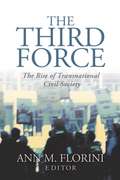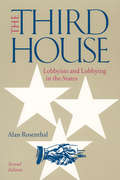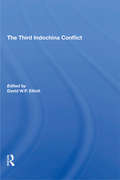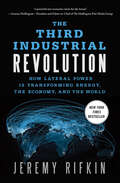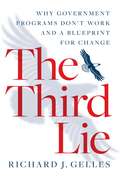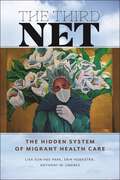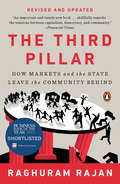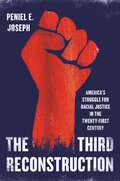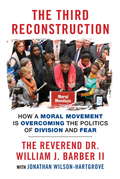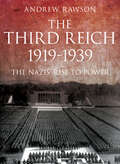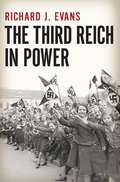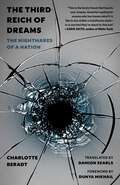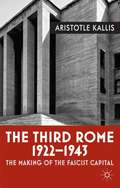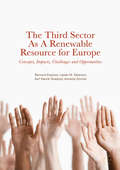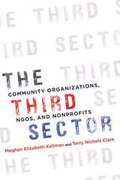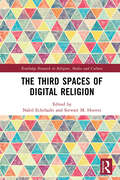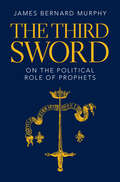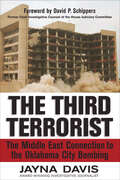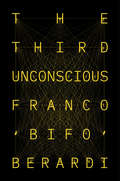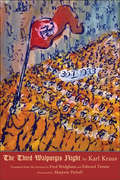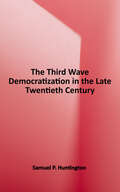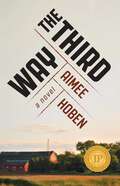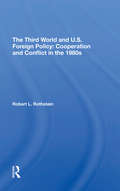- Table View
- List View
The Third Force
by Ann M. FloriniFrom the landmines campaign to the Seattle protests against the WTO to the World Commission on Dams, transnational networks of civil society groups are seizing an ever-greater voice in how governments run countries and how corporations do business. This volume brings together a multinational group of authors to help policy makers, scholars, business people, and activists themselves understand the profound issues raised.Contributors include Fredrik Galtung, Rebecca Johnson, Sanjeev Khagram, Chetan Kumar, Motoko Mekata, Thomas Risse, P.J. Simmons, and Yahya Dehqanzada.
The Third House: Lobbyists and Lobbying in the States (2nd Edition)
by Alan RosenthalThe book, which has drawn praise for its inviting and accessible style, thoroughly examines the lobbying scene: the settings in which lobbying takes place, the types and styles of lobbyists, the broad range of approaches and techniques used by lobbyists, and the role and influence of lobbying in our system of representative democracy. A favorite among professors and students alike, The Third House is a great choice as a supplement for courses on state politics or interest groups.
The Third Indochina Conflict
by David Elliott Gareth PorterThe Third Indochina Conflict (1975-) is seen by some as the escalation of a local quarrel between Vietnam and Kampuchea; others attribute it to the attempts of external powers to advance their own interests by encouraging conflict among the various Indochinese states; most agree that it is a logical--but not inevitable--consequence of the First (1946-54) and Second (1959-75) Indochinese conflicts. The contributors to this book analyze the origins and development of the Third Indochinese Conflict and the problems posed by the complex issues involved.
The Third Industrial Revolution: How Lateral Power Is Transforming Energy, the Economy, and the World
by Jeremy RifkinA New York Times–bestselling account of the next great economic era, with a look into the individuals pioneering its implementation around the world.One of the most influential social thinkers of our time reveals how Internet technology and renewable energy are merging to create the new jobs of the twenty-first century and change the world.In The Third Industrial Revolution, Jeremy Rifkin takes us on a journey into a new economic era where hundred of millions of people produce their own green energy in their homes, businesses, and factories and share it with each other on an “energy Internet.” Rifkin’s Third Industrial Revolution vision has been taken up by the European Union and China and endorsed by the United Nations. In this book, the author goes behind the scenes to meet the heads of state, global CEOs, social entrepreneurs, and NGO leaders who are pioneering the new economic paradigm.Praise for The Third Industrial Revolution“Jeremy Rifkin argues that green energy and the internet will revolutionize society and the environment . . . With the European Union already on board, this is a big idea with backbone.” —Nature“Impeccably argued . . . a compelling and cogent argument to overhaul our society and economy in favor of a distributed and collaborative model.” —Publishers Weekly
The Third Lie: Why Government Programs Don't Work—and a Blueprint for Change
by Richard J Gelles“I am from the government and I am here to help you” is one of the three biggest lies, or so the old joke goes. Richard J. Gelles, dean of social policy at University of Pennsylvania, explains why government programs designed to cure social ills don’t work in sector after sector…and never could work. He demonstrates how each creates its own bureaucracy to monitor participation in the program, an entrenched administrative apparatus whose needs supersede those for whom the program was designed. Against this, he contrasts universal programs such as the GI Bill, Social Security, and Medicare, the most successful, sustained government programs ever established. Gelles’s provocative, controversial proposal for a universal entitlement to replace a raft of lumbering social programs should be read by all in social services, policy studies, and government.
The Third Net: The Hidden System of Migrant Health Care (Health, Society, and Inequality #5)
by Lisa Sun-Hee Park Erin Hoekstra Anthony M. JimenezReveals the presence of an informal system of valuable support and care for marginalized migrantsThe United States’ health care system not only consists of a formal safety net, but also an informal and disjointed network of organizations that offer basic care to millions of migrants. This “Third Net” provides free or low-cost health care for the undocumented, low-income, and uninsured migrants who are excluded from the formal system. This groundbreaking study sheds light on the existence of the Third Net and its implications for the overall inequalities in the US health care system.The Third Net is made up of diverse providers with varying levels of service, organizational culture, and mission. These providers operate in unconventional settings, such as mobile clinics on wheels; pop-up clinics in repurposed spaces; and unlicensed, makeshift clinics run by health activists. Despite their unassuming appearances, these clinics are vital resources for marginalized populations that often go unnoticed by the general public, revealing the shortcomings of our formal health care system.By examining these alternative health care spaces, the authors expose the inequities entrenched in the broader health care system and urge a reevaluation of it entirely in order to address these injustices.
The Third Pillar: How Markets and the State Leave the Community Behind
by Raghuram RajanFrom one of the most important economic thinkers of our time, a brilliant and far-seeing analysis of the current populist backlash against globalization.Raghuram Rajan, distinguished University of Chicago professor, former IMF chief economist, head of India's central bank, and author of the 2010 FT-Goldman-Sachs Book of the Year Fault Lines, has an unparalleled vantage point onto the social and economic consequences of globalization and their ultimate effect on our politics. In The Third Pillar he offers up a magnificent big-picture framework for understanding how these three forces--the state, markets, and our communities--interact, why things begin to break down, and how we can find our way back to a more secure and stable plane. The "third pillar" of the title is the community we live in. Economists all too often understand their field as the relationship between markets and the state, and they leave squishy social issues for other people. That's not just myopic, Rajan argues; it's dangerous. All economics is actually socioeconomics - all markets are embedded in a web of human relations, values and norms. As he shows, throughout history, technological phase shifts have ripped the market out of those old webs and led to violent backlashes, and to what we now call populism. Eventually, a new equilibrium is reached, but it can be ugly and messy, especially if done wrong. Right now, we're doing it wrong. As markets scale up, the state scales up with it, concentrating economic and political power in flourishing central hubs and leaving the periphery to decompose, figuratively and even literally. Instead, Rajan offers a way to rethink the relationship between the market and civil society and argues for a return to strengthening and empowering local communities as an antidote to growing despair and unrest. Rajan is not a doctrinaire conservative, so his ultimate argument that decision-making has to be devolved to the grass roots or our democracy will continue to wither, is sure to be provocative. But even setting aside its solutions, The Third Pillar is a masterpiece of explication, a book that will be a classic of its kind for its offering of a wise, authoritative and humane explanation of the forces that have wrought such a sea change in our lives.
The Third Reconstruction: America's Struggle for Racial Justice in the Twenty-First Century
by Peniel E. JosephOne of our preeminent historians of race and democracy argues that the period since 2008 has marked nothing less than America&’s Third ReconstructionIn The Third Reconstruction, distinguished historian Peniel E. Joseph offers a powerful and personal new interpretation of recent history. The racial reckoning that unfolded in 2020, he argues, marked the climax of a Third Reconstruction: a new struggle for citizenship and dignity for Black Americans, just as momentous as the movements that arose after the Civil War and during the civil rights era. Joseph draws revealing connections and insights across centuries as he traces this Third Reconstruction from the election of Barack Obama to the rise of Black Lives Matter to the failed assault on the Capitol.America&’s first and second Reconstructions fell tragically short of their grand aims. Our Third Reconstruction offers a new chance to achieve Black dignity and citizenship at last—an opportunity to choose hope over fear.
The Third Reconstruction: How a Moral Movement Is Overcoming the Politics of Division and Fear
by Jonathan Wilson-Hartgrove Rev William J. Barber IIA modern-day civil rights champion tells the stirring story of how he helped start a movement to bridge America's racial divide.Over the summer of 2013, the Reverend Dr. William J. Barber II led more than a hundred thousand people at rallies across North Carolina to protest restrictions to voting access and an extreme makeover of state government. These protests--the largest state government-focused civil disobedience campaign in American history--came to be known as Moral Mondays and have since blossomed in states as diverse as Florida, Tennessee, Wisconsin, Ohio, and New York.At a time when divide-and-conquer politics are exacerbating racial strife and economic inequality, Rev. Barber offers an impassioned, historically grounded argument that Moral Mondays are hard evidence of an embryonic Third Reconstruction in America.The first Reconstruction briefly flourished after Emancipation, and the second Reconstruction ushered in meaningful progress in the civil rights era. But both were met by ferocious reactionary measures that severely curtailed, and in many cases rolled back, racial and economic progress. This Third Reconstruction is a profoundly moral awakening of justice-loving people united in a fusion coalition powerful enough to reclaim the possibility of democracy--even in the face of corporate-financed extremism.In this memoir of how Rev. Barber and allies as diverse as progressive Christians, union members, and immigration-rights activists came together to build a coalition, he offers a trenchant analysis of race-based inequality and a hopeful message for a nation grappling with persistent racial and economic injustice. Rev. Barber writes movingly--and pragmatically--about how he laid the groundwork for a state-by-state movement that unites black, white, and brown, rich and poor, employed and unemployed, gay and straight, documented and undocumented, religious and secular. Only such a diverse fusion movement, Rev. Barber argues, can heal our nation's wounds and produce public policy that is morally defensible, constitutionally consistent, and economically sane. The Third Reconstruction is both a blueprint for movement building and an inspiring call to action from the twenty-first century's most effective grassroots organizer.From the Hardcover edition.
The Third Reich 1919-1939: The Nazis' Rise to Power
by Andrew RawsonThe rise of Hitler's Nazi Party is one of the defining phenomena of the twentieth century. The manner in which National Socialist ideologies took over life in Germany is difficult to comprehend over 75 years later. This fully illustrated book is a single volume encyclopedia on all aspects of this period in modern history. It starts with a shattered post-war Germany and charts the violent political tactics used by the Nazis to seize political control in 1933. The subsequent consolidation of power and brutal suppression of opponents followed as they took over all areas of society, introducing a new festival calendar to celebrate their takeover. The various military, political and youth organisations are considered, the Nazis' warped methods for maintaining law and order and their use of the press and propaganda to control the people and introduce their racial ideals. Chapters also cover art, culture, education, the economy, resistance, the leaders themselves, and more.
The Third Reich in Power, 1933-1939
by Richard J. EvansFrom the front flap: THE DEFINITIVE ACCOUNT OF GERMANY'S MALIGN TRANSFORMATION UNDER HITLER'S TOTAL RULE AND THE IMPLACABLE MARCH TO WAR. BY THE MIDDLE OF 1933, the democracy of the Weimar Republic had been transformed into the police state of the Third Reich, mobilized around the cult of the leader, Adolf Hitler. If this could happen in less than a year, what would the future hold? Only the most fervent Nazi party loyalists would have predicted how radical the transformation ahead would be. In The Third Reich in Power, Richard J. Evans tells the story of Germany's radical reshaping under Nazi rule. Every area of life, from literature, culture and the arts to religion, education and science, was subordinated to the relentless drive to prepare Germany for war. His book shows how the Nazis attempted to penetrate and reorder every aspect of German society, encountering many kinds and degrees of resistance along the way, but gradually winning the acceptance of the German people in the long run. Those who were seen as unworthy to be counted among the German people were dealt with in increasingly brutal terms. The Nazi regime took more and more radical measures against the racially "unfit," including Germany's Jews, Gypsies, homosexuals, mentally ill, "asocial" and "habitual" criminals. After six years of foreign policy brinkmanship that took the Nazi regime from success to success, Hitler's drive to prepare Germany for the war that he saw as its destiny reached its fateful hour in September 1939. The war he unleashed was to plunge the world into a maelstrom of genocide and destruction. The Third Reich in Power is the fullest and most authoritative account yet written of how, in six years, Germany was brought to the edge of that terrible abyss.
The Third Reich of Dreams: The Nightmares of a Nation
by Charlotte BeradtThe hidden history of a nation sleepwalking its way into evilCharlotte Beradt began having unsettling dreams after Adolf Hitler took power in 1933. She envisioned herself being shot at, tortured and scalped, surrounded by Nazis in disguise, and breathlessly fleeing across fields with storm troopers at her heels. Shaken by these nightmares and banned as a Jew from working, she began secretly collecting dreams from her friends and neighbors, both Jewish and non-Jewish. Disguising these &“diaries of the night&” in code and concealing them in the spines of books from her extensive library, she smuggled them out of the country one by one.Available again for the first time since its publication in the 1960s, this sensational book brings together this uniquely powerful dream record, offering a visceral understanding of how terror is internalized and how propaganda colonizes the imagination. After Beradt herself fled Germany for New York, she collected these dream accounts and began to trace the common symbols and themes that appeared in the collective unconscious of a traumatized nation. The fear of dictatorship was ever-present. Dreams of thought control, even the prohibition of dreaming itself, bore witness to the collapse of outer and inner worlds.Now in a haunting new translation by Damion Searls and with an incisive foreword by Dunya Mikhail, The Third Reich of Dreams provides a raw, unfiltered, and prophetic look inside the experience of living through Hitler&’s terror.
The Third Reich's Intelligence Services
by Katrin PaehlerThis is the first-ever analytical study of Nazi Germany's political foreign intelligence service, Office VI of the Reichssicherheitshauptamt and its head, Walter Schellenberg. Katrin Paehler tells the story of Schellenberg's career in policing and intelligence, charts the development and activities of the service he eventually headed, and discusses his attempts to place it at the center of Nazi foreign intelligence and foreign policy. The book locates the service in its proper pedigree of the SS as well as in relation to its two main rivals - the Abwehr and the Ausw#65533;rtige Amt. It also considers the role Nazi ideology played in the conceptualization and execution of foreign intelligence, revealing how this ideological prism fractured and distorted Office VI's view of the world. The book is based on contemporary and postwar documents - many recently declassified - from archives in the United States, Germany, and Russia.
The Third Rome, 1922-1943: The Making of the Fascist Capital
by Aristotle KallisWhat kind of city was the Fascist 'third Rome'? Imagined and real, rooted in the past and announcing a new, 'revolutionary' future, Fascist Rome was imagined both as the ideal city and as the sacred centre of a universal political religion. Kallis explores this through a journey across the sites, monuments, and buildings of the fascist capital.
The Third Sector As A Renewable Resource for Europe: Concepts, Impacts, Challenges And Opportunities
by Lester M. Salamon Annette Zimmer Karl Henrik Sivesind Bernard EnjolrasThis book provides a critical account of the third sector and its future in Europe. It offers an original conceptualization of the third sector in its European manifestations alongside an overview of its major contours, including its structure, sources of support, and recent trends. It also assesses the impact of this sector in Europe which considers its contributions to European economic development, citizen well-being and human development. The Third Sector As A Renewable Resource for Europe presents the findings of the Third Sector Impact (TSI) project funded by the European Union’s Seventh Framework Program (FP7). It recognises that in a time of social and economic distress, as well as enormous pressures on governmental budgets, the third sector and volunteering represent a unique ‘renewable resource’ for social and economic problem-solving and civic engagement in Europe.
The Third Sector: Community Organizations, NGOs, and Nonprofits
by Meghan Kallman Terry ClarkCivil society organizations, nonprofits, national and international nongovernmental organizations, and a variety of formal and informal associations have coalesced into a world political force. Though the components of this so-called third sector vary by country, their cumulative effects play an ever-greater role in global affairs. Looking at relief and welfare organizations, innovation organizations, social networks, and many other kinds of groups, Meghan Elizabeth Kallman and Terry Nichols Clark explore the functions, impacts, and composition of the nonprofit sector in six key countries. Chinese organizations, for example, follow the predominantly Asian model of government funding that links their mission to national political goals. Western groups, by contrast, often explicitly challenge government objectives, and even gain relevance and cache by doing so. In addition, Kallman and Clark examine groups in real-world contexts, providing a wealth of political-historical background, in-depth consideration of interactions with state institutions, region-by-region comparisons, and suggestions for how groups can borrow policy options across systems. Insightful and forward-seeing, The Third Sector provides a rare international view of organizations and agendas driving change in today's international affairs.
The Third Space of Sovereignty: The Postcolonial Politics of U.S.–Indigenous Relations (Indigenous Americas)
by Kevin BruyneelThe imposition of modern American colonial rule has defined U.S.–indigenous relations since the time of the American Civil War. In resistance, Kevin Bruyneel asserts, indigenous political actors work across American spatial and temporal boundaries, demanding rights and resources from the government while also challenging the imposition of colonial rule over their lives. This resistance engenders what he calls a &“third space of sovereignty,&” which resides neither inside nor outside the U.S. political system but rather exists on its boundaries, exposing both the practices and limitations of American colonial rule. The Third Space of Sovereignty offers fresh insights on such topics as the crucial importance of the formal end of treaty-making in 1871, indigenous responses to the prospect of U.S. citizenship in the 1920s, native politics during the tumultuous civil rights era of the 1960s, the question of indigenousness in the special election of California&’s governor in 2003, and the current issues surrounding gaming and casinos. In this engaging and provocative work, Bruyneel shows how native political actors have effectively contested the narrow limits that the United States has imposed on indigenous people&’s ability to define their identity and to develop economically and politically on their own terms. Kevin Bruyneel is assistant professor of politics at Babson College.
The Third Spaces of Digital Religion (Routledge Research in Religion, Media and Culture)
by Stewart M. Hoover Nabil EchchaibiThis exciting volume explores how religious meaning is generated and performed in our present digital media ecosystem. It uses the spatial metaphor of a third space to visualize the mobility of everyday religion and to explore the dynamic ways in which contemporary subjects imagine, produce, and navigate new religious and spiritual places. Comprised of seven original essays, this book provides a rigorous discussion of the complex intersections of the digital and religion, demonstrating how third spaces of religion stand out by virtue of their in-betweenness. They exist between private and public, between institution and individual, between authority and individual autonomy, between large media framings and individual "pro-sumption," and between local and translocal. Including probing analysis of how Muslim, Catholic, and Neo-Pagan identities are cultivated and developed online, case studies reflect on the creative outcomes of this condition of in-betweenness and the emergence of other places of religious and spiritual meaning. Blending theoretical analysis with grounded empirical research, this book is essential reading for students and scholars of contemporary religion, media and religion, sociology of religion, religion, and popular culture.
The Third Terrorist: The Middle East Connection to the Oklahoma City Bombing
by Jayna DavisIn this alarming book, reporter Jayna Davis tells of her amazing journey leading from the smoking rubble of the Murrah Federal Building to the sleazy haunts of John Doe #2, the mysterious Middle East suspect who the Justice Department was at first desperate to find?then insisted never existed.With a reporter's practiced skill, Jayna Davis unscrambles the convoluted and distorted facts of the Oklahoma City bombing to present a compelling case that proves Timothy McVeigh and Terry Nichols did not act alone and in fact worked in tandem with Middle East connections that lead directly to Saddam Hussein's personal army.Ten years after the tragic April 19 bombing, this revised edition of the controversial book that captured the attention of the 9/11 Commission offers new information and a new afterword that covers the Iraq War, the verdict in the Nichols state murder trial, and recent confirmation of Al-Qaeda General Al-Zawahiri's visit to OKC to approve the bombing.
The Third Unconscious
by Franco Bifo BerardiA wide-ranging exploration of the present, and the future, of the UnconciousThe Unconscious knows no time, it has no before-and-after, it does not have a history of its own. Yet, it does not always remain the same. Different political and economic conditions transform the way in which the Unconscious emerges within the "psychosphere" of society. In the early 20th century, Freud characterized the Unconscious as the dark side of the well-order framework of Progress and Reason. At the end of the past century, Deleuze and Guattari described it as a laboratory: the magmatic force ceaselessly bringing to the fore new possibilities of imagination. Today, at a time of viral pandemics and in the midst of the catastrophic collapse of capitalism, the Unconscious has begun to emerge in yet another form. In this book, Franco 'Bifo' Berardi vividly portraits the form in which the Unconscious will make itself manifest for decades to come, and the challenges that it will pose to our possibilities of political action, poetic imagination, and therapy.
The Third Walpurgis Night: The Complete Text (The Margellos World Republic of Letters)
by Karl KrausThe first complete English translation of a far-seeing polemic, written in 1933 by the preeminent German-language satirist, unmasking the Nazi seizure of power Austrian satirist and polemicist Karl Kraus’s Third Walpurgis Night was written in immediate response to the Nazi seizure of power in 1933 but was withheld from publication for fear of reprisals against Jews trapped in Germany. Acclaimed when finally published by Kösel Verlag in 1952, it is a devastatingly prescient exposure, giving special attention to the regime’s corruption of language as masterminded by Joseph Goebbels. Bertolt Brecht wrote to Kraus that, in his indictment of Nazism, “you have disclosed the atrocities of intonation and created an ethics of language.” <P><P>This masterful translation, by the prizewinning translators of Kraus’s The Last Days of Mankind, aims for clarity where Kraus had good reason to be cautious and obscure. The Austrian Jewish author Karl Kraus (1874–1936) was the foremost German-language satirist of the twentieth century. As editor of the journal Die Fackel (The Torch) he single-handedly after 1912 conducted a sustained critique of propaganda and the press, expressed through polemical essays, satirical plays, witty aphorisms, and resonant poems.
The Third Wave: Democratization in the Late Twentieth Century (The\julian J. Rothbaum Distinguished Lecture Ser. #4)
by Samuel P. HuntingtonBetween 1974 and 1990 more than thirty countries in southern Europe, Latin America, East Asia, and Eastern Europe shifted from authoritarian to democratic systems of government. This global democratic revolution is probably the most important political trend in the late twentieth century. In The Third Wave, Samuel P. Huntington analyzes the causes and nature of these democratic transitions, evaluates the prospects for stability of the new democracies, and explores the possibility of more countries becoming democratic. The recent transitions, he argues, are the third major wave of democratization in the modern world. Each of the two previous waves was followed by a reverse wave in which some countries shifted back to authoritarian governments. Using concrete examples, empirical evidence, and insightful analysis, Huntington provides neither a theory nor a history of the third wave, but an explanation of why and how it occurred. Factors responsible for the democratic trend include the legitimacy dilemmas of authoritarian regimes; economic and social development; the changed role of the Catholic Church; the impact of the United States, the European Community, and the Soviet Union; and the "snowballing" phenomenon: change in one country stimulating change in others. Five key elite groups within and outside the nondemocratic regime played roles in shaping the various ways democratization occurred. Compromise was key to all democratizations, and elections and nonviolent tactics were also central. New democracies must deal with the "torturer problem" and the "praetorian problem" and attempt to develop democratic values and processes. Disillusionment with democracy, Huntington argues, is necessary to consolidating democracy. He concludes the book with an analysis of the political, economic, and cultural factors that will decide whether or not the third wave continues. Several "Guidelines for Democratizers" offer specific, practical suggestions for initiating and carrying out reform. Huntington's emphasis on practical application makes this book a valuable tool for anyone engaged in the democratization process. At this volatile time in history, Huntington's assessment of the processes of democratization is indispensable to understanding the future of democracy in the world.
The Third Way: A Novel
by Aimee HobenWhen mega-corporation Unibank threatens to foreclose on her grandmother’s South Dakota farm, Arden Firth fights back with a revolutionary idea. Enlisting the help of an enigmatic law student, Justin Kirish, Arden builds a campaign to abolish corporations in the state. To win, she must overcome her fear of public speaking and learn to lead while juggling her growing feelings for Kirish. When secrets from the past and dark corporate forces threaten to destroy their movement, however, the success of the ballot campaign suddenly hangs in the balance.A novel charting the intersection between idealism, extremism, and forgiveness, The Third Way—awarded the Independent Publishers Book Award 2023 IPPY Gold Medal for Popular Fiction—is perfect for fans of Barbara Kingsolver and Margaret Atwood.
The Third World And U.s. Foreign Policy: Cooperation And Conflict In The 1980s
by Robert L. RothsteinThe quest for a viable policy toward the Third World will be a dominant theme in U.S. foreign policy throughout this decade. But before any judgments can be made about the range of choices for U.S. policymakers, it is necessary to understand the pressures that are likely to confront developing nations during the 1980s as well as the efforts of these nations as a group to extract greater resources and attention from the international system. This book considers policy responses that have been and are likely to be implemented by developing nations as they face increasing pressures in the areas of food, energy, trade, and debt – the main areas of interaction within the international system. The author also presents an analysis of how the North-South Dialogue functions and why it has produced so few genuine settlements, providing an additional perspective on whether the pressures on the developing countries might be diminished by successful global negotiations. The conclusions reached by examining policy responses and the Dialogue itself provide the basis for a number of specific policy prescriptions. They also help to establish a framework within which U.S. policy initiatives toward the Third World must be formed. The two concluding chapters discuss these policy choices in detail, carefully analyzing the advantages and disadvantages of persisting in present policies, attempting a genuine global restructuring, choosing to concentrate attention on a few "new influentials" in the Third World, and trying to construct a new approach out of selected elements of the other policy approaches.
